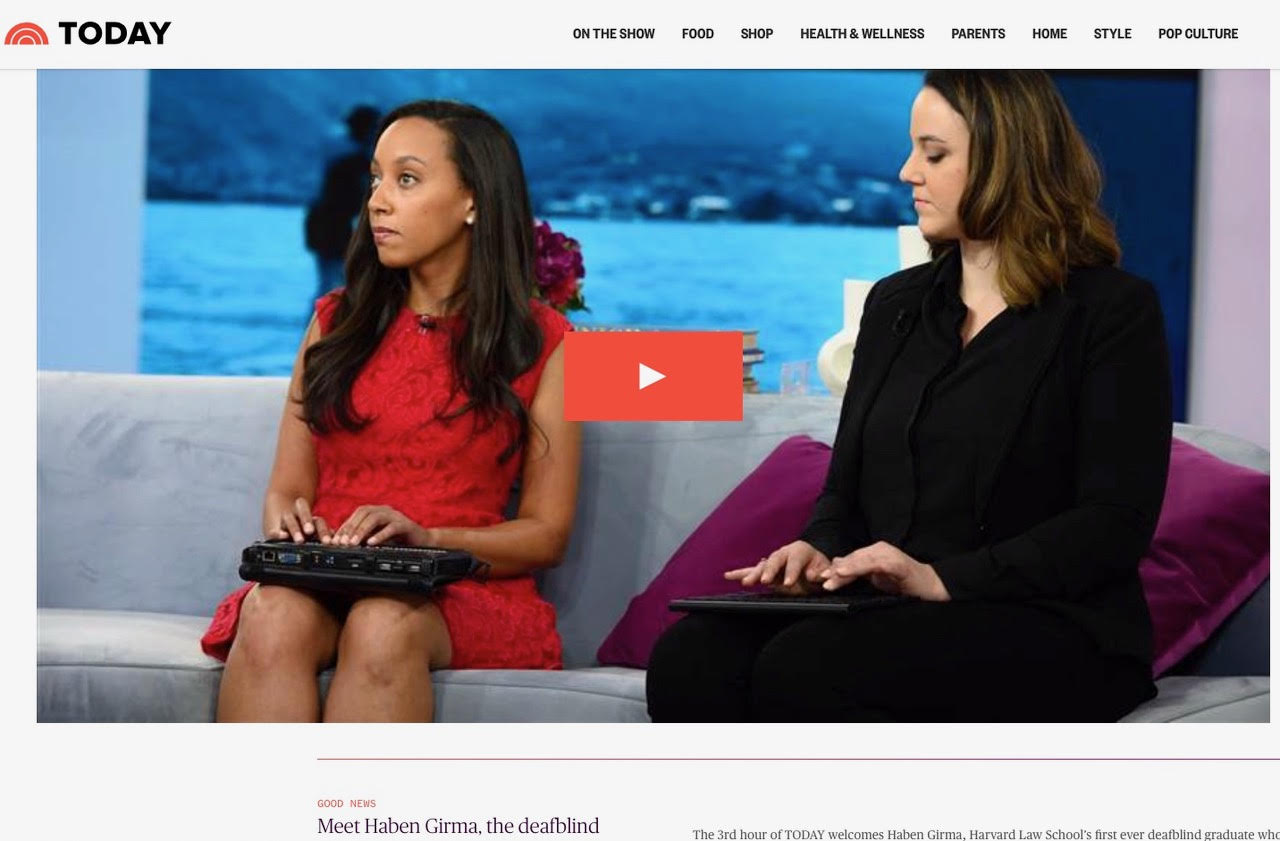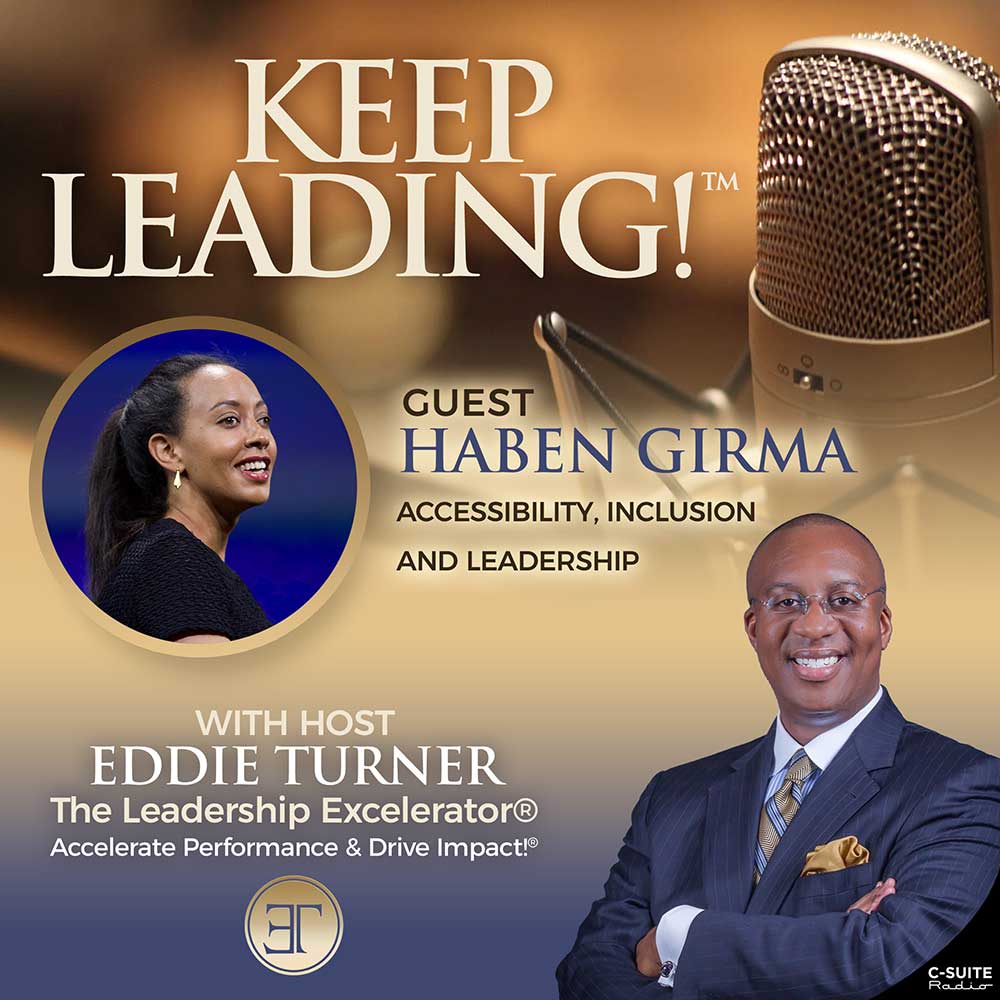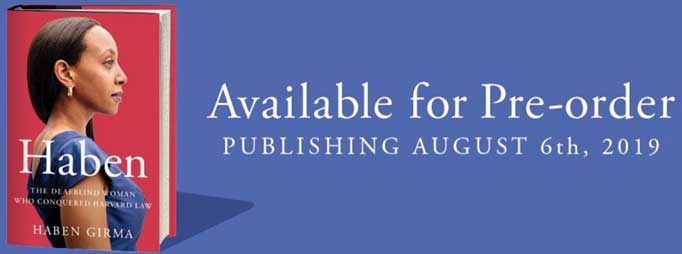Haben Girma
Disability Rights Lawyer and Speaker
Author of Haben—The Deafblind Woman Who Conquered Harvard Law
Accessibility, Inclusion and Leadership
Episode Summary
Haben Girma is the first Deafblind person to graduate from Harvard Law School. In this episode, we discuss Haben’s coming new book and her advocacy for equal opportunities for people with disabilities and why it matters for leaders.
Check out this 60 Second preview of the episode!
Bio
The first Deafblind person to graduate from Harvard Law School, Haben Girma advocates for equal opportunities for people with disabilities. President Obama named her a White House Champion of Change. She received the Helen Keller Achievement Award, and a spot on the Forbes 30 Under 30 list. President Bill Clinton, Prime Minister Justin Trudeau, and Chancellor Angela Merkel have all honored Haben. Haben believes disability is an opportunity for innovation. She travels the world teaching the benefits of choosing inclusion. On August 6 she will publish her first book, Haben: The Deafblind Woman Who Conquered Harvard Law.
Website
habengirma.com
LinkedIn
https://www.linkedin.com/in/habengirma/
Twitter
https://twitter.com/HabenGirma
Facebook
facebook.com/habengirma
Instagram
https://www.instagram.com/habengirma
Haben Girma releases her new book on the Today Show

Leadership Quote
“Be the change you want to see in the world.”

Transcript
This podcast is part of the C Suite Radio Network, turning the volume off on business.
Welcome to The Keep Leading Podcast, a podcast dedicated to promoting leadership development and sharing leadership insights. Here’s your host, the leadership accelerator, Eddie Turner.
Hello, everyone. Welcome to The Keep Leading Podcast, the podcast dedicated to leadership development and insights. I’m your host, Eddie Turner, the Leadership Accelerator.
Did you know that people with disabilities drive innovation? Did you know that people with disabilities represent the largest minority group numbering 1 billion worldwide? I did not know those things until I heard about Haben Girma, a leading voice on disability, innovation and leadership. Haben is going to tell us the reason it is absolutely imperative that if we are going to be great leaders, we need to understand the importance of accessibility and inclusion. So accessibility, inclusion, and leadership, we’ll learn about this and more from the amazing Haben Girma right after this.
This podcast is sponsored by Eddie Turner LLC. Eddie Turner LLC delivers executive and leadership coaching, professional speaking, facilitation services, and management consulting across the globe. Eddie Turner LLC also creates voiceovers, serves as a master of ceremonies, as a panel and event moderator, and provides national media commentary. Visit EddieTurnerLLC.com to learn more.
Hello, everyone. Welcome to The Keep Leading Podcast, the podcast dedicated to leadership development and insights. I’m your host, Eddie Turner, the Leadership Accelerator. I work with leaders to accelerate performance and drive impact.
Did you know people with disabilities drive innovation? Did you know people with disabilities represent the largest minority group numbering one billion worldwide? I did not know that until I heard about Haben Girma. She’s a leading voice on disability, innovation, and leadership. Haben Girma advocates for equal opportunities for people with disabilities and is the first deaf blind person to graduate from Harvard Law School. President Obama named her a White House Champion of Change. She received the Helen Keller Achievement Award and a spot on Forbes 30 Under 30 List. President Clinton, Prime Minister Justin Trudeau, and Chancellor Angela Merkel have all honored Haben. Haben believes disability is an opportunity for innovation and she travels the world teaching the benefits of choosing inclusion. And on August 6 she’s publishing her first book entitled Haben – The Deaf Blind Woman Who Conquered Harvard Law School.
Haben, welcome to The Key Leading Podcast.
Well, I am more thrilled to have you here.
So, Haben, a lot of people are probably wondering how are we able to conduct this podcast interview at this time.
Thank you Haben. Yes. Well, we want people to pay attention to those with disabilities because it’s the human thing to do and as a good leader every leader should consider that but you’re making the point for us that it’s also a good business decision. It drives a business’s profitability to look at this market. So thank you for sharing that.
Haben, let me tell people how I met you, how I learned about you. My best friend sent me a message while he was sitting in the audience while you were giving a speech to a major global consultancy. And my best friend, Carl Winchester, he said to me “Eddie, I am sitting here listening to one of the most inspiring people I have heard in a very long time.” That got my attention because if my friend Carl was saying that about someone, I said “I must know who this is.” He sent me an image of you on the stage and I did not recognize you but I started to look you up. And they came to me. I remember the striking photo of you with President Obama but, of course, I didn’t know who you were at the time. So that’s how I discovered you and I’m so happy that you agreed to come on the show because I want to share with people your message, just a little bit of what you share with that great firm. Can you share with us what your message is when you’re on the road speaking and advocating on behalf of those with disabilities?
That’s a powerful message and I love how you said that. It’s very true. I hadn’t thought about it. You just said that that oftentimes it is only from a charity perspective that an organization will approach disabilities. I love how you are making the case that this is a strong thing that business people for all types of reasons should focus on and make it a part of their core operating principles.
Now some people may wonder how can an organization become more accessible?
Great question. There are many different aspects to accessibility. There’s physical accessibility. Make sure your physical space, your buildings, your stores are wheelchair accessible. There are guidelines for how to design for wheelchair accessible spaces. There’s stuff like making sure doorways are wide enough. If there’s stairs into the building, ensure that there’s a ramp or an elevator so that all aspects of the facility are available to everyone.
There’s also digital accessibility. Make sure websites and apps are accessible. People who are blind use computers through screen readers. Screen readers or software applications that convert graphical information on the screen to speech or digital Braille. There are guidelines that teach developers how to make the websites and apps accessible. There’s the Web Content Accessibility Guidelines for apps. There’s Android and Apple accessibility guidelines. And it’s often just making changes behind the scenes in the code. The visual layout usually does not change. So it won’t really change the appearance of your services but it’ll make them accessible to people who are using screen readers to access content. It also makes your content more discoverable to non-disabled people and disabled people. For example, if you add captions to your videos or transcripts to your podcasts, then more people will find your content because there’s more text associated with your content – search engine optimization. So digital accessibility features helps your content become more discoverable to everyone and gives you a larger audience.
Uh oh. Haben, you just got me and it looks like you just put something else on my to-do list. I am going to have to start creating a transcript for my podcast. Thank you for sharing that with me and I’m sure many others will benefit.
And I like what you said there. I like everything you said but something you said there really resonates from the standpoint of I saw your video performance speaking to 4000 developers at Apple at their Worldwide Developers Conference. And anyone who’s following Apple knows that is a big deal. And for you to speak to them and address them says a lot about their positioning on accessibility but also how you speaking directly to the people at the heart of producing apps is so meaningful. Can you share with folks the illustration that you used when you told the developers about the importance of taking accessibility into consideration before designing an app?
Okay, thank you for sharing that as well, giving all of us something to think about as we are planning events or attending events how we can be more conscious to be inclusive of those with disabilities.
Haben, I do a lot of events for women’s organizations and for the National Diversity Council and I’ve had to learn through my work in these areas new terms and new shifts and language to be able to effectively operate in these areas. There’s some things I was saying that weren’t necessarily right. So is their language or terms that you hear people using in regards to their interaction with people with disabilities that you think we should correct in our communication as leaders with those with disabilities?
Okay. Thank you, Haben. I have done that already and I’m going to definitely stick with it now. So good to get that clarification from you and to help all of us elevate our language. And certainly the other thing that you said, being kind and being patient with each other, and certainly as we deal with our fellow human beings who are dealing with a disability. So, thank you, Haben.
What I would like to do now is just pause briefly for a word from our sponsors.
This podcast is sponsored by Eddie Turner LLC. Organizations who need to accelerate the development of their leaders call Eddie Turner the Leadership Accelerator. Eddie works with leaders to accelerate performance and drive impact. Call Eddie Turner to help your leaders one-on-one as their coach or to inspire them as a group through the power of facilitation or a keynote address. Visit EddieTurnerLLC.com to learn more.
This is Phil M. Jones, author of Exactly What To Say, Exactly How To Sell, and Exactly Where To Start and you’re listening to The Keep Leading Podcast with Eddie Turner.
Okay, we’re back with Haben Girma. She is the first deaf blind graduate of Harvard Law School. She earned a spot on Forbes 30 Under 30 List. She is a President Obama White House Champion of Change designee. She’s a disability rights lawyer, an author, and a speaker.
So really happy to have you with us, Haben. And as we were going to our break, Haben was helping us as leaders use the right language when it comes to our communication with those with disabilities.
Haben, is there anything you would like to add to what you were saying to make sure that we use the right language as leaders with those with disabilities?
Very good reminder, Haben. Thank you for adding further clarification to that for us.
Now talking about being included, you don’t let anything hold you back. I got to admit, I am a little bit of a scared person when it comes to being adventurous but when I saw the video of you out there surfing, when I saw that you are out there climbing on jungle gyms, I mean, you’ve traveled the world, you’ve even designed accessibility tools, where do you get the motivation to just do all these things and experiment without fear?
Oh my goodness, she just put me on blast. Alright, Haben, yes, I have now made a commitment I have to fulfill.
All right. So now I really want to talk about your book. I am excited and I want to encourage all my listeners to go out and get a copy of Haben. And tell us about your book, Haben. It’s coming out on August 6 but what else?
Wonderful, wonderful. Yes, we want them to tap into it, not to take advantage. Yes, good.
So the other point that I wanted to take away from that, so we have a couple things to look for in your book, it’s going to be available in which formats?
All right, I believe that. I believe that. And I know that people will really enjoy hearing from you directly.
I could talk to you for hours, Haben. There’s so many things going through my mind right now, so many things I would like to ask. What am I missing? Is there something that I should be asking you that you would like to share or that burning question that you probably hear over and over? What did I miss?
Excellent. Very well said.
Haben, on The Keep Leading Podcast we always ask what advice would you give to leaders, what quote, what story would you like to share that allows leaders to keep leading.
All right, very well said – “Be the change you want to see in the world” – and certainly, Haben, you are living that, you are a walking breathing example. And I am sure that all of my listeners who are hearing our conversation are now looking at themselves introspectively and saying “What we can do to remove barriers that we think that may be holding us back to get out there and embrace any challenges that we have and to push ourselves and those around us to higher levels.” So thank you for sharing that quote and thank you for sharing your incredible story. You are an inspiration, Haben, and I am certainly all the better for having spoken with you.
Where can my listeners learn more about you?
Thank you, Haben. And we’re going to make sure we put a link directly to your website in the show notes. We’re going to put a link to how people can purchase your book and to all your social media profiles. We want folks to go out and please support Haben by purchasing her book, follow her on social media, and if you have an organization where you need to bring in speakers and you need legal advice about disabilities, advocacy, Haben Girma is the person you need.
Haben, thank you for being on The Keep Leading Podcast.
It was my pleasure.
And thank you. This concludes this episode, everyone. I’m Eddie Turner, the Leadership Accelerator, reminding you that leadership is not about our title or our position. Leadership is an activity. Leadership is action. It’s not the case of once a leader, always a leader. It’s not a garment we put on and take off. We must be a leader at our core and allow it to emanate in all we do. So whatever you’re doing, always keep leading.
Thank you for listening to your host Eddie Turner on The Keep Leading Podcast. Please remember to subscribe to The Keep Leading Podcast on iTunes or wherever you listen. For more information about Eddie Turner’s work please visit EddieTurnerLLC.com.
Thank you for listening to C Suite Radio, turning the volume up on business.
The Keep Leading!™ podcast is for people passionate about leadership. It is dedicated to leadership development and insights. Join your host Eddie Turner, The Leadership Excelerator® as he speaks with accomplished leaders and people of influence across the globe as they share their journey to leadership excellence. Listen as they share leadership strategies, techniques and insights. For more information visit eddieturnerllc.com or follow Eddie Turner on Twitter and Instagram at @eddieturnerjr. Like Eddie Turner LLC on Facebook. Connect with Eddie Turner on LinkedIn.




